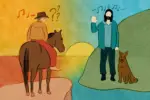It is February 2018, and Sufjan Stevens rises from the floor. It’s the 90th Oscars ceremony, and the meek but emphatic prince of indie-folk is dressed in a purple striped suit and flowering bowtie, joined by St. Vincent and Moses Sumney — artists that he either helped bring up or inspired. Stevens and his small Mount Rushmore of 21st-century songwriters are performing his Oscar-nominated song, “Mystery of Love,” from “Call Me By Your Name.” Stevens’ whispered vocals are almost swallowed up by the massive stage. The song feels too intimate for an award show, not unlike Elliot Smith’s performance of “Miss Misery” back in 1998. Neither artist won the Oscar.
Today, Stevens is weeks away from releasing his newest album, “The Ascension.” But his Oscar performance, now two and half years old, feels strangely entwined with his image. The singer-songwriter and multi-instrumentalist is one of the original icons of independent music, but the magnitude of his presence feels odd for someone known for their quiet aesthetic. Stevens’ has made a habit of contrasting his earnest and understated music with flashes of the grandiose.
In November of 2015, Stevens taped a live film of his album, “Carrie and Lowell,” in Charleston, South Carolina. The album is named for his stepfather and late mother, and is a deeply affecting passage of grief and fleeting memories of the past. The final song from the album that Stevens performs is titled “Blue Bucket of Gold.”
It’s a harrowing lament, asking for love that was never given by a mother who abandoned him and his siblings when he was young. As Stevens sings, images of a young boy running on the beach play behind him like a moving stained glass window.
But then the song ends, and the images of a fractured childhood are replaced by the face of rapper and pop giant, Drake. The band proceeds to dive into a cover of Drake’s “Hotline Bling,” joined by R&B singer Gallant. Stevens throws on some oversized, fluorescent orange sunglasses and awkwardly dances with delightful abandon. It’s very cute.
Stevens has been a part of music’s cultural dialogue for a very long time. His career has spanned over 20 years, and through it all, his catalog has rarely felt uninspired. Few artists have been able to maintain a career as long as Stevens’ while still moving out of their comfort zone. Even though the Michigan native is known for his subdued folk songs, he has ventured off into various innovative directions since his debut, “A Sun Came,” in 1999.
None of which match the sprawling experimental piece “Age of Adz,” brimming with futuristic synths and abrasive drum machines. Stevens showed no hesitancy in shedding the hyper-specific vignettes of Americana found in his earlier works. For an artist who quickly honed his niche, reinvention was inevitable. “Age of Adz” showed what Stevens was capable of; it indicated the direction he would take his songwriting, though not immediately.
“Carrie and Lowell,” Stevens last formal release, was both a return and a departure from his previous styles. While there are similar aspects to the meticulously written folk songs of his early career, the writing is far more personal.
“With this record, I needed to extract myself out of this environment of make-believe,” Stevens said to Pitchfork back in 2015. “It’s something that was necessary for me to do in the wake of my mother’s death — to pursue a sense of peace and serenity in spite of suffering. It’s not really trying to say anything new, or prove anything, or innovate. It feels artless, which is a good thing. This is not my art project; this is my life.”
The ode to his absent mother and still present stepfather is an open confrontation with loss. It is not a happy album, but not unhappy, either. It is strangely liberating to hear someone face their grief so honestly.
“Carrie and Lowell” was also a departure from Stevens’ role as an American historian. At one point Stevens promised to complete the ambitious feat of writing an album about each of the 50 states. He only made it through two, but he has rarely abandoned his national scope. His tight lyrical flourishes make his music feel very literary, like reading a book filled with small towns, strange characters and sobering stills of America’s working class.
Steven’s has always been fixated on larger than life, sometimes tragic, pop culture figures. In a profile for the Guardian when “Age of Adz” was released, he was reported as being inspired by artist Prophet Royal Robertson, “a paranoid schizophrenic whose paintings were dominated by monsters, superheroes and his ‘adulterous whore’ wife.”
Stevens’ songs have been titled after the likes of serial killer John Wayne Gacy and infamous figure skating icon Tonya Harding. Most recently, Stevens dropped a B-Side to his single “America” titled “My Rajneesh,” in reference to Bhagwan Shri Rajneesh — founder of the controversial Rajneesh movement covered in the Netflix documentary series “Wild Wild Country.”
Rajneesh seems to fit right in with the aforementioned figures. All are plagued with a tragic legacy that they either caused or were at the mercy of. But Stevens paints these people in a surprisingly tender light, and over time, they have come to stand as symbols in his complex portrait of America.
So far, Stevens has dropped two singles off of “The Ascension,” set to release on Sept. 25. The latest is “Video Game,” a somber piece of synth pop in which Stevens plays with themes of individualism and the implications of being a public figure.
But the aforementioned “America” holds the stronger connection to Stevens’ work as a whole. In the twelve and a half minute long track, which was released the day before the Fourth of July, Stevens recounts a relationship with the country that is riddled with abuse and lost promises. For many, the message could not ring more true.
















